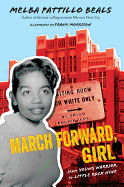
Journalist and activist Melba Patillo Beals begins her account of her early life for school-age readers by describing the atmosphere of terror in which black Americans lived under Jim Crow laws: "The first thing I remember about being a person living in Little Rock, Arkansas... is the gut-wrenching fear in my heart and in my tummy that I was in danger." At only three years of age, she realized that the culture of her small town was such that "the color of [her] skin framed the entire scope of [her] life." She felt this injustice deeply, even before she had learned the word "segregation."
Nighttime was when her fear was the greatest. "Mother and Grandma would begin the ritual I watched for my entire childhood," she writes. "They would close the windows, draw all the curtains... dim the lights, and silence the radio" in hopes of keeping their home off the Ku Klux Klan's radar. Still, Melba had more than one horrifying experience with the Klan, who terrorized her small town with impunity. In one instance, a black man was lynched in her church as the parishioners gathered for service; in another, she just barely escaped rape and likely murder at a Klan rally.
March Forward, Girl tells Beals's story in a direct, open way that young readers are sure to appreciate. Her writing is approachable and she pulls no punches: the reader is given a clear view of what growing up in the Jim Crow South entailed. Beals ends her narrative right before she became one of the Little Rock Nine, including the very briefest of reports on her high school experience in an epilogue. This is perhaps a perfect way to invite readers to further explore her--and the United States'--history. --Siân Gaetano, children's and YA editor, Shelf Awareness

